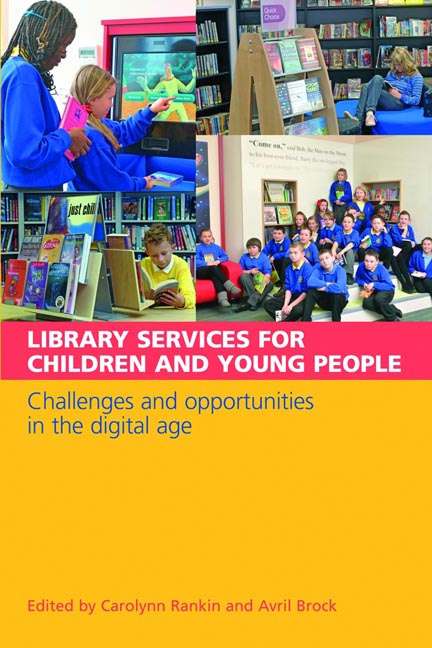Book contents
- Frontmatter
- Dedication
- Contents
- Contributors
- Foreword
- Acknowledgements
- Introduction and vision for the book
- Part 1 Children's library services – policy, people and partnerships
- Part 2 Connecting and engaging – reaching your audience and catching the latest wave
- Part 3 Buildings, design and spaces – libraries for children and young people
- Part 4 Issues for professional practice
- 14 The importance of service evaluation in libraries for children and schools
- 15 The rights of the child and youth advocacy – issues for professional practice in the library setting
- Index
14 - The importance of service evaluation in libraries for children and schools
from Part 4 - Issues for professional practice
Published online by Cambridge University Press: 08 June 2018
- Frontmatter
- Dedication
- Contents
- Contributors
- Foreword
- Acknowledgements
- Introduction and vision for the book
- Part 1 Children's library services – policy, people and partnerships
- Part 2 Connecting and engaging – reaching your audience and catching the latest wave
- Part 3 Buildings, design and spaces – libraries for children and young people
- Part 4 Issues for professional practice
- 14 The importance of service evaluation in libraries for children and schools
- 15 The rights of the child and youth advocacy – issues for professional practice in the library setting
- Index
Summary
Introduction to the evaluation context
Today, libraries for children and young people and their connected adults are constantly challenged, by changing expectations, financial pressures and the need to forge new relationships, both within our parent organizations and with external partners. These library services operate within a context of accountability: to the tax-payer, to local authorities, to school governing bodies, to parents and to grant-funding bodies. Perhaps least emphasized, but most important, should be our accountability to children and young people themselves. This chapter will discuss the situation in the UK for both public library services for children and young people (hereafter referred to as CYPS) and learning resource centres in schools (LRCs)
This chapter will outline the evaluation process, identify a range of resources to support practitioners and offer suggestions for the future.
There is no single set of standards for CYPS or LRCs in the UK, against which to evaluate services. The Public Library Service Standards for England were abolished in 2008 (DCMS, 2008). While the Welsh Public Library Standards continue, using a three-yearly framework, and Northern Ireland works with Delivering Tomorrow's Libraries (DACL, 2006), embedding ten service standards, the content addressing children's services is severely limited. Scotland, on the other hand, has a more developed Public Library Quality Improvement Matrix (SLIC, 2007). Of more significant use is the UK Children's Public Library User Survey (C-PLUS) – a voluntary tool, intended for periodic, normally triennial, user consultation. Scottish schools have Improving Libraries for Learners (SLIC, 2009) – an evaluation framework, agreed with and recognized by the Scottish schools inspectorate. In England and Wales, school libraries may choose to use the optional self-evaluation toolkit Improve Your Library (DfES, 2004).
How we shape relevant services and, thus, communicate our value to management, councils and partner bodies is critical. Libraries have much to offer in furthering local and national agendas for literacy, digital and information confidence and in providing access to services supporting employment and cultural engagement. Yet, this contribution is infrequently spelled out in any detail, if at all, in government policy documents, in a way that makes it easy to recognize and test. Currently, both public and school library services have been vulnerable to cuts and de-professionalization.
- Type
- Chapter
- Information
- Library Services for Children and Young PeopleChallenges and opportunities in the digital age, pp. 207 - 220Publisher: FacetPrint publication year: 2012
- 1
- Cited by

